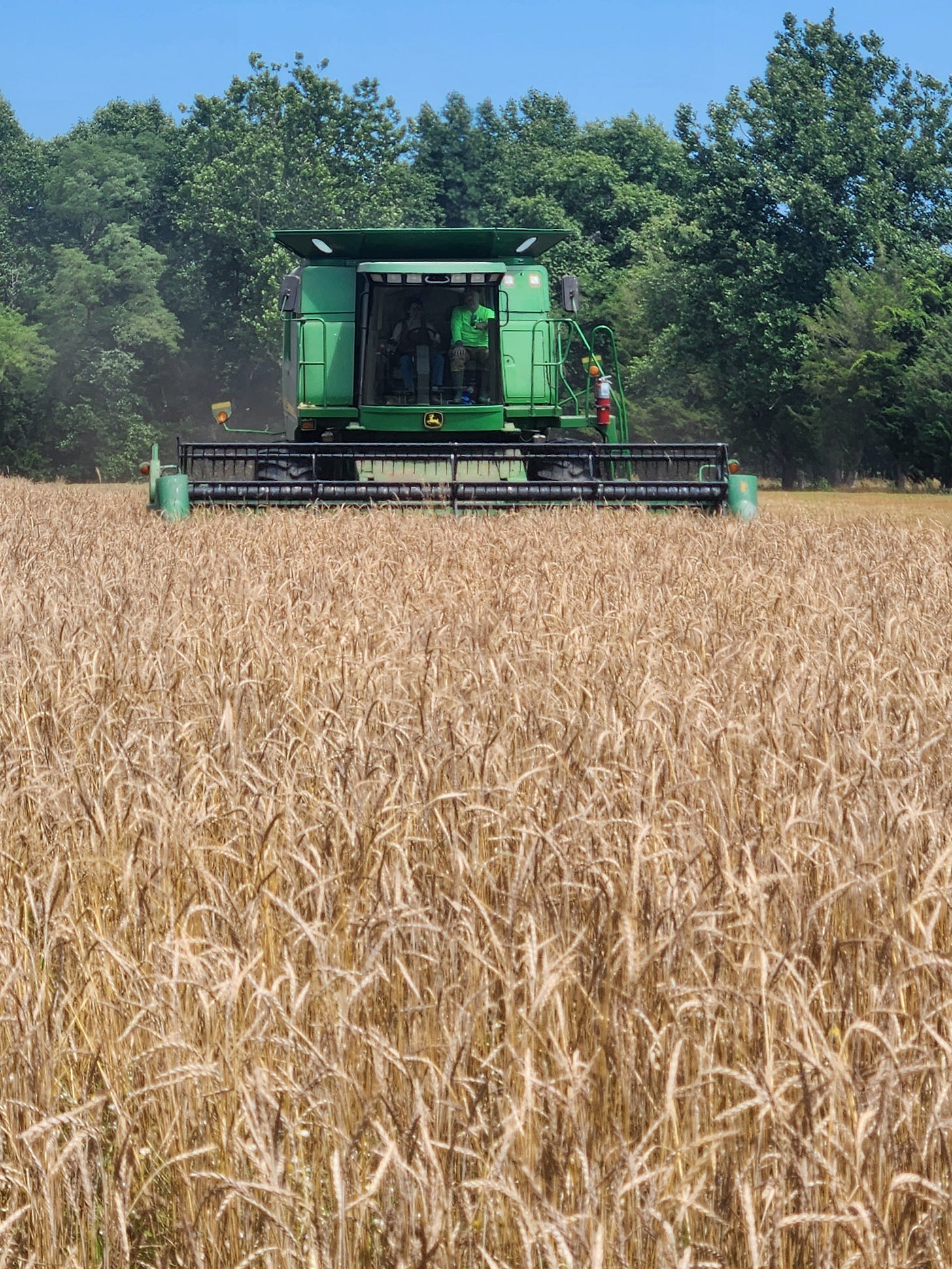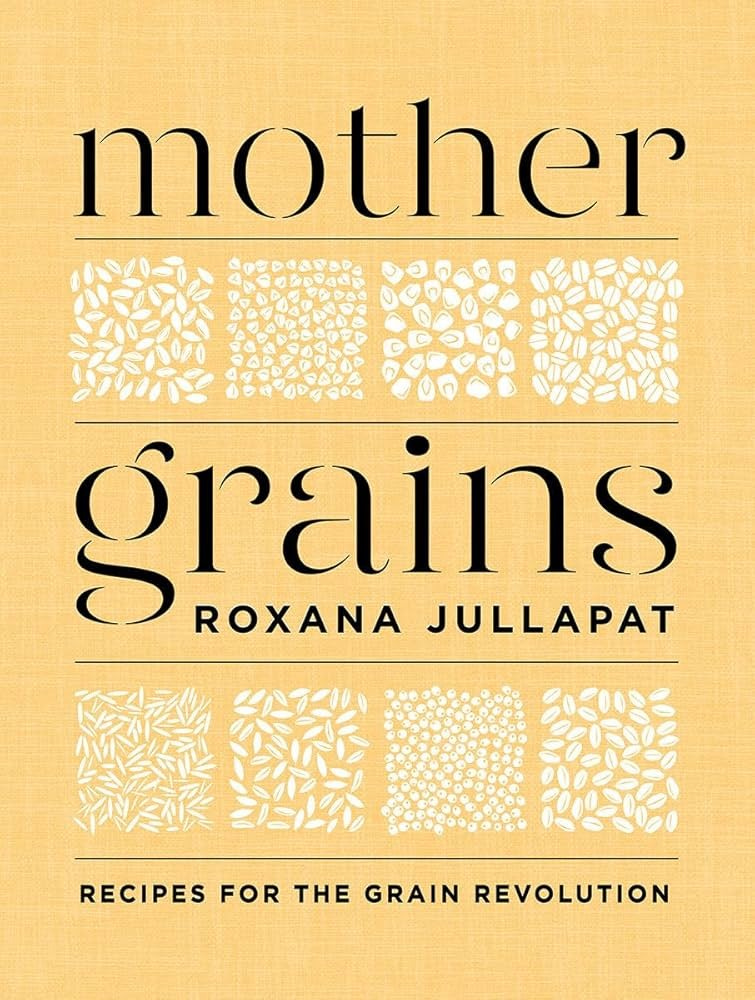Welcome to the second part of our four-part series on grains! This series was inspired by research for an article that’s in this month’s issue of Richmond Magazine, which you can check out here. As I was working on the story, there were so many interesting insights and extras that just didn’t fit into the print story or even the extended online version, so I’m sharing it all here! This week, we’re hearing from a family farm that’s growing small grains in Virginia. Next week, we’ll take a look at Deep Roots Milling, and then we’ll finish up the series with thoughts from Evrim and Evin Dogu of Sub Rosa Bakery.
While working on this story and even prior to it, every discussion I had with bakers, brewers, and millers around the topic of small grains pointed back to one operation — Grapewood Farm. The family-owned and operated farm, which specializes in ‘Virginia Grown, Virginia Ground’ grains, is situated on 500 acres in the beautiful Northern Neck. Fred, Cathy, Peter, and David Sachs are warm and inviting (literally every conversation ends with them inviting me to the farm), and they’re also incredibly smart and honest about what they do. Here are a couple of quotes from Fred and David that resonated with me.

In Their Words: Fred and David Sachs, Grapewood Farm 🌾
Flour is flavor…
Fred Sachs: The flavor that you get from fresh ground flour is totally different from what you're going to buy at the supermarket. Why do you prefer one bottle of wine over another? It’s about flavor. We know that, from our own fields, when we grow a crop, the same crop grown on two different fields are really two different products. The novelty and the challenge to the bakers is really to find the expression of that local ingredient in their final products and to have some variety from season to season to offer the customers
Neighbors helping neighbors…
David Sachs: I think we could look at how various different sectors of agriculture are working together in other places. What we see is that having the allies and partnerships and forming that community and culture within within agriculture is important. If you look at Pennsylvania and other states, we see models where dairy and other agricultural systems support row crop production in a way that we don't necessarily have the same access to. So for us, we’re looking at soil health and how to develop systems that protect the soil. Because in a conventional system, it's very easy to just spray it and forget it, but in these organic systems, you have to really pay attention to the timing, and crop management becomes something that, as a new farmer, is a huge hurdle. It's a very steep learning curve that is only made manageable when you work with others and you have other people to mentor you and to teach you and help you, because you just can't learn it all in one season.
You Need This Cookbook 📕
I think one of the biggest barriers to home cooks and bakers using these small grains is intimidation. These precious little bags of flour are typically more expensive than commodity flour, and there’s rarely a recipe on the back of the bag.
One of the best resources I’ve found for working with these grains is the 2021 cookbook, Mother Grains: Recipes for the Grain Revolution, by Roxana Jullapat. (And I’ll let you in on a sneaky little tip: The way I figure out if a cookbook is worth my time [and money] is to check it out first from the library OR try to find a Google Books or Amazon preview of the book to test a recipe before I make the commitment.) In this case, I highly suggest starting with Jullapat’s Chocolate Buckwheat Cake. It’s made entirely of buckwheat flour and is, thus, gluten-free, which makes it a great choice for entertaining a crowd — no need to fret over surprise gluten intolerance! Plus, rich chocolate and earthy buckwheat are just made for each other. You’ll see. (Serve it warm with ice cream and chocolate ganache, and get back to me.)
🚨 GIVEAWAY ALERT! 🚨
And because I’m serious about getting this cookbook into your hot little hands, I’m offering a free copy for one lucky newsletter reader! Just comment below with a grain you’d like to get to know better, and you’ll be entered to win a copy of Mother Grains! I’ll announce the winner here next week.
You Need This Pasta 🍝
Maybe you’re not much of a baker, but you still want to dabble in the good grains. I’ve got one word for you: Pasta. My personal sfoglina (Ok, she’s not my personal sfoglina, but she sells pasta at the farmers markets I go to, so she kind of is), Laine Myers of Oro Pasta, recommends starting with Grapewood’s Appalachian White Wheat, “because it’s hard wheat that has a very high gluten and protein content; perfect for elasticity and extensibility in pasta making.” She notes that you could also cut in some spelt flour for flavor. Try it in this tried & true pasta recipe (or use your personal favorite pasta recipe). And if you happen to be near Richmond, give Oro’s fresh pasta a try. You can find them at The Birdhouse and St. Steve’s Farmers Markets as well as the monthly Pizza Bones Saturday Market.
Until next time…
xox
SG










I'm really interested in learning more about sorghum for sustainability purposes, but after a recent trip to Copenhagen, I'm definitely on a rye kick. (And a quest to perfect the cardamom bun!)
Einkorn I guess, because my mother-in-law is obsessed with it so I have a bag I need to use up. 😇